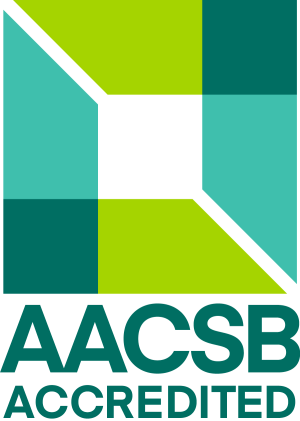
Showing content for section Overview
Overview
Digital technology is having a dramatic impact on the business world. Companies can use real-time data to inform strategy and improve products and processes, while technologies such as artificial intelligence, machine learning and blockchain are creating 'intelligent enterprises'.
On this MSc Digital Business Management Master's degree course, you'll learn about the frameworks, models, strategies and systems you can use to make effective, real-time decisions across a company's internal and external operating environments. You'll explore how leading enterprise software, including SAP applications, enables development and implementation of digital change in business.
When you complete the course, you'll have the skills and practical experience you need to lead and manage the digital transformation of businesses in any industry.
Join our Postgraduate Open Events
From finding out which postgraduate option is right for you, to exploring the perfect course, browse our upcoming webinars and in-person events and book your place today.
Accreditation

Contact information
Entry requirements
MSc Digital Business Management Master's degree entry requirements
Qualifications or work experience
- A second-class honours degree or equivalent in a relevant subject or a master's degree in an appropriate subject.
- Exceptionally, equivalent professional experience and/or qualifications will be considered.
English language requirements
- English language proficiency at a minimum of IELTS band 6.5 with no component score below 6.0.
If you don't meet the English language requirements yet, you can achieve the level you need by successfully completing a pre-sessional English programme before you start your course.
Course costs and funding
September 2024 / January 2025 start
- Full time: £12,000
- Part time: £6,000 a year (subject to annual increase)
(including Transition Scholarship)
- Full time: £12,000
- Part time: £6,000 a year (subject to annual increase)
- Full time: £17,900
- Part time: £8,950 a year (subject to annual increase)
Funding your studies
Find out more how to fund your studies, including the scholarships and bursaries you could get. You can also find more about tuition fees and living costs, including what your tuition fees cover.
If you're a UK student, you may be eligible for a Government postgraduate loan, which you can use to help with course fees and living costs.
Applying from outside the UK? Find out about funding options for international students.
Additional course costs
These course-related costs aren’t included in the tuition fees. So you’ll need to budget for them when you plan your spending.
Additional costs
Our accommodation section shows your accommodation options and highlights how much it costs to live in Portsmouth.
You’ll study up to 6 modules a year. You may have to read several recommended books or textbooks for each module.
You can borrow most of these from the Library. If you buy these, they may cost up to £60 each.
We recommend that you budget £75 a year for photocopying, memory sticks, DVDs and CDs, printing charges, binding and specialist printing.
If your final year includes a major project, there could be cost for transport or accommodation related to your research activities. The amount will depend on the project you choose.
Modules
Each module on this Digital Business Management Master's degree course is worth 15 or 30 credits.
If you do this course full-time (over 1 year), you'll study modules worth a total of 180 credits.
If you do this course part-time (over 2 years), you'll study modules worth 75 credits in each year with a 30-credit consultancy project in the summer months between years 1 and 2.
Modules currently being studied
Core modules in this year include:
- Business Analytics - 30 credits
- Customer Experience Management - 30 credits
- Digital Business Applications - 30 credits
- Digital Business Consulting Project - 30 credits
- Digital Strategy and Leadership - 15 credits
- Digital Technology and Innovation - 30 credits
- Digital Transformation - 15 credits
There are no optional modules. Your consulting project allows you to study areas that match your interests and career aspirations.
We're a member of UKISUG (an independent SAP user group). This means you can also learn more about specific SAP applications by taking additional modules and courses, which are available at significantly discounted rates through the SAP Learning Hub Professional Edition portal.
Many of these are hosted on campus at our SAP Next-Gen Innovation Lab. They allow you to get industry-recognised certifications in areas such as:
- enterprise systems
- database modelling
- human resources
- business finance and budgeting
- the Internet of Things
- application development
Changes to course content
We use the best and most current research and professional practice alongside feedback from our students to make sure course content is relevant to your future career or further studies.
Therefore, some course content may change over time to reflect changes in the discipline or industry. If a module doesn't run, we'll let you know as soon as possible and help you choose an alternative module.

Read Jakub's storyFrom the first day, my course concentrated on the impact of digital technology on the business world. My lecturers are experts in their fields, with knowledge of the latest academic frameworks and models, business trends, strategies and leading enterprise software.
Work experience and career planning
Personal development planning
During the course, we'll support you in creating a Personal Development Plan. This allows you to combine the skills you gain during your Master's studies with optional professional certification opportunities, for example, through learning portals such as the SAP Learning Hub.
Industry experience
The Digital Business Consulting Project module gives you practical experience applying what you've learnt to the industry and real business cases. With our support, you can apply to work on a business case project in a company to develop digital transformation solutions. Alternatively, you can work on a digital consulting case report.
UKISUG membership
Our membership of UKISUG links you to special interest groups, and gives you access to hundreds of companies that are looking for graduates and professionals with the skills and experience you'll gain on this course.
Teaching
Teaching methods on this course include:
- lectures
- interactive seminars
- tutorials (one-to-one and in groups)
- practical laboratory sessions
- company visits
You'll also have access to Moodle, our virtual learning environment. This includes:
- lecture media and seminar materials
- case studies (for both seminars and lab practical sessions)
- course notices
- discussions
What you'll experience
On this Digital Business Management Master's degree course, you'll:
- Learn how to initiate and lead digital change from academics with professional experience and industry speakers
- Study topics such as digital strategy and leadership, digital technology and innovation, customer experience management, digital transformation, digital business applications and business analytics
- Sharpen your critical thinking, creative, analytical decision-making and reporting skills along with developing skills in using industry-leading SAP applications, and other ERP, CRM software in your career
- Have the opportunity to apply for a digital business consulting project to develop digital solutions, working with a company in the UK or overseas, or real business cases with industrial/academic mentors.
- Complete a digital business consulting project, where you'll work with a company in the UK or overseas to develop and implement digital solutions
- Use computer labs, where you'll see how businesses can use technologies and concepts such as the Internet of Things, machine learning, blockchain, analytics and 'big data' to transform their products and processes
- Get access to our library’s electronic resources 24/7, including thousands of ebooks, ejournals and newspapers, and databases
- Study full-time over 1 year or part-time over 2 years, at a university that has excellent teaching, research and industry engagement in this subject area
- You’ll benefit from our SAP University Alliance membership through access to their learning hub and reduced membership pricing for your SAP certification
Business and management studies at the University of Portsmouth is ranked 2nd of the modern universities by research power.
Research Excellence Framework (REF) 2021
Read more about our business and management research
How you'll spend your time
We recognise that you'll probably be juggling more demands when you do your Master's degree, as you may be working or you may have family responsibilities.
We'll give you as much indication here as we can of how much time you'll need to be on campus and how many hours you can expect to spend in self-directed study, but please note that these indications are always subject to change. You should receive your full timetable several weeks before you start with us.
A typical week
You'll typically spend 30–40 hours a week studying if you're a full-time student, or 15–20 hours a week if you study part-time.
This includes 10–14 hours a week in scheduled teaching activities if you study full-time, or 5–7 hours a week if you study part-time.
The rest of your study time is self-directed, with support from staff when you need it. This includes activities such as reading books and journals, preparing presentations, writing assignments, using SAP software and applications, working with team members on group work, and personal development planning.
Most teaching takes place during the day, Monday to Friday. There's occasional evening teaching. You'll spend the summer months working on your digital consultancy project with a sponsor company.
Term times
An academic year is divided into 3 teaching blocks and 2 assessment periods:
- September to December (October to December for some courses in 2020/21 only) – teaching block 1
- January – assessment period 1
- January to May – teaching block 2 (includes Easter break)
- May to June – assessment period 2
- June to September – teaching block 3 (consultancy project)
If you start the course in January, you'll begin in teaching block 2.
Career development
There's significant, increasing demand for professionals with the technical skill to deliver digital transformation for businesses and create new businesses using digital technology. This makes it a perfect time to study digital business management.
What can I do with a Master's degree in Digital Business Management?
When you graduate, you'll have the skills and experience to manage a digital business, lead digital transformation and innovation projects, and create new business opportunities using digital technology.
What can you do with a Digital Business Management degree?
Areas you could work in include:
- enterprise systems
- application development
- business analytics
- general management
- internet sales and brokerage
- digital transformation
- digital marketing
What jobs can you do with a Digital Business Management degree?
Job roles you could go onto include:
- product manager
- client relationships/key accounts manager
- digital business practitioner
- digital transformation specialist
- enterprise system specialist
- digital platform specialist
- entrepreneur
- consultant
You could also continue your studies at PhD level in disciplines such as intelligent enterprise.
Career support
We'll give you plenty of support in finding employment through careers events, recruitment fairs and our close industrial contacts.
After you leave the University, you can get help, advice and support for up to 5 years from our Careers and Employability service, as you advance your career.
You can also continue to attend events coordinated through our Business Services Research Office, and Alumni Association, giving you chances to build contacts in the industry and keep your knowledge up-to-date.
Supporting you
Learning support
As well as support by faculty teaching staff and your personal tutor, you can use the University’s Academic Skills Unit (ASK).
ASK provides one-to-one support in areas such as:
- academic writing
- note taking
- time management
- critical thinking
- presentation skills
- referencing
- working in groups
- revision, memory and exam techniques
Personal tutor
Your personal tutor gives you academic and personal support throughout your time at university. They also help you make the transition from employment to university if you're returning to study after a break.
As well as regular scheduled meetings with your personal tutor, they're also available at set times if you want to chat with them about anything that can't wait until your next meeting.
Study support tutors
You'll have help from a team of study support tutors.
Based within the Faculty of Business and Law, these tutors are familiar with the specific requirements your assignments and work closely with faculty academics. This means they can give you focused support with the specific study skills you need to be successful on your course – face-to-face, by phone and email, and by video call.
They can help with:
- academic writing (for example, essays, reports, dissertations, projects and literature reviews)
- reflective writing skills
- critical thinking skills
- delivering presentations (including observing and filming presentations)
- understanding and using assignment feedback
- managing your time and workload
- revision and exam techniques
If you're a mature student returning to study, specialist support is available.
Technical support
The faculty's Technical Services Unit provides help with technical facilities, including lab support.
Library support
Library staff are available 24/7 in person or by email, phone or online chat to help you make the most of the University’s library resources. You can also request one-to-one appointments and get support from a librarian who specialises in your subject area.
Maths and stats support
The Maths Cafe offers advice and assistance with mathematical skills in a friendly, informal environment. You can come to our daily drop-in sessions, develop your maths skills at a workshop or use our online resources.
How you're assessed
You’ll be assessed through:
- group research posters and 'poster defence' events
- written and video reports
- screencasts (incorporating a report and a practical exercise)
- your consulting project
You'll submit most of your coursework using our virtual learning environment, Moodle.
You can test your skills and knowledge informally before you do assessments that count towards your final mark. You'll get feedback on all practice and formal assessments so you can improve in the future.
Apply
Starting in September 2024
- Full-time study (1 year)
- Part-time study (2 years)
Starting in January 2025
- Full-time study (1 year)
- Part-time study (2 years)
International students
If you're from outside of the UK, you can apply directly to us (above) or you can get an agent to help with your application. Check your country page for details of agents in your region. To find out what to include in your application, head to the how to apply page of our international students section.
If you don’t meet the English language requirements for this course yet, you can achieve the level you need by successfully completing a pre-sessional English programme before you start your course.
Admissions terms and conditions
When you accept an offer to study at the University of Portsmouth, you also agree to abide by our Student Contract (which includes the University's relevant policies, rules and regulations). You should read and consider these before you apply.
